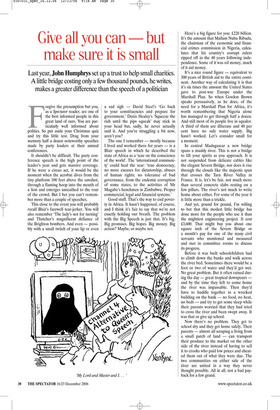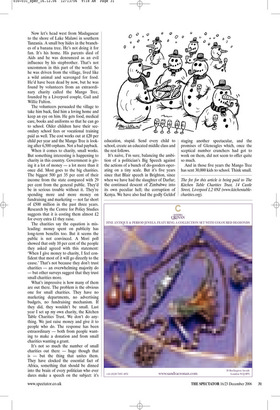Give all you can — but make sure it is small
Last year, John Humphrys set up a trust to help small charities. A little bridge costing only a few thousand pounds, he writes, makes a greater difference than the speech of a politician Forgive the presumption but you, as a Spectator reader, are one of the best informed people in this great land of ours. You are particularly well informed about politics. So put aside your Christmas quiz and try this little test. Drag from your memory half a dozen noteworthy speeches made by party leaders at their annual conferences.
It shouldn’t be difficult. The party conference speech is the high point of the leader’s year and gets massive coverage. If he were a circus act, it would be the moment when the acrobat dives from the tiny platform 100 feet above the sawdust, through a flaming hoop into the mouth of a lion and emerges unscathed to the roar of the crowd. But I bet you can’t remember more than a couple of speeches.
This close to the event you will probably recall Blair’s farewell tear-jerker. You will also remember ‘The lady’s not for turning’ and Thatcher’s magnificent defiance of the Brighton bombers. And even — possibly with a small twitch of your lip or even a sad sigh — David Steel’s ‘Go back to your constituencies and prepare for government.’ Denis Healey’s ‘Squeeze the rich until the pips squeak’ may stick in your head but, sadly, he never actually said it. And you’re struggling a bit now, aren’t you?
The one I remember — mostly because I lived and worked there for years — is a Blair speech in which he described the state of Africa as a ‘scar on the conscience of the world’. The ‘international community’ could heal the scar: ‘true democracy, no more excuses for dictatorship, abuses of human rights; no tolerance of bad governance, from the endemic corruption of some states, to the activities of Mr Mugabe’s henchmen in Zimbabwe. Proper commercial, legal and financial systems.’ Good stuff. That’s the way to end poverty in Africa. It hasn’t happened, of course, and I think it’s fair to say that we’re not exactly holding our breath. The problem with the Big Speech is just that. It’s big. Big promises. Big hopes. Big money. Big action? Maybe, or maybe not. Here’s a big figure for you: £220 billion. It’s the amount that Mallam Nuhu Ribadu, the chairman of the economic and financial crimes commission in Nigeria, calculates that his country’s corrupt rulers ripped off in the 40 years following independence. Some of it was oil money, much of it aid money.
It’s a nice round figure — equivalent to 300 years of British aid to the entire continent. Another way of calculating it is that it’s six times the amount the United States gave to post-war Europe under the Marshall Plan. So when Gordon Brown speaks persuasively, as he does, of the need for a Marshall Plan for Africa, it’s worth remembering that Nigeria alone has managed to get through half a dozen. And still most of its people live in squalor. A third of them are illiterate and 40 per cent have no safe water supply. Big hasn’t worked. Let’s consider small for a moment.
In central Madagascar a new bridge spans a muddy river. This is not a bridge to lift your spirits as you approach. It is not suspended from delicate cables like the elegant Severn Bridge, nor does it rise through the clouds like the majestic span that crosses the Tarn River Valley in France. It is, let’s be fair, not much more than several concrete slabs resting on a few pillars. The river’s not much to write home about either. For some of the year it is little more than a trickle.
And yet, pound for pound, I’m willing to bet that this modest little bridge has done more for the people who use it than the mightiest engineering project. It cost £3,600. That might buy you about one square inch of the Severn Bridge or a month’s pay for one of the many civil servants who monitored and measured and met in committee rooms to discuss its progress.
Before it was built schoolchildren had to climb down the banks and walk across the river bed. Sometimes there would be a foot or two of water and they’d get wet. No great problem. But it often rained during the day — great tropical downpours and by the time they left to come home the river was impassable. Then they’d have to huddle together in a wrecked building on the bank — no food, no heat, no beds — and try to get some sleep while their parents worried that they had tried to cross the river and been swept away. It was that or give up school.
Now there’s no problem. They get to school dry and they get home safely. Their parents — almost all scraping a living from a small patch of land — can transport their produce to the market on the other side of the river instead of having to sell it to crooks who paid low prices and cheated them out of what they were due. The two communities on either side of the river are united in a way they never thought possible. All in all, not a bad payback for a few grand. Now let’s head west from Madagascar to the shore of Lake Malawi in southern Tanzania. A small boy hides in the branches of a banana tree. He’s not doing it for fun. It’s his home. His parents died of Aids and he was denounced as an evil influence by his stepbrother. That’s not uncommon in this part of the world. So he was driven from the village, lived like a wild animal and scavenged for food. He’d have been dead by now, but he was found by volunteers from an extraordinary charity called the Mango Tree, founded by a Liverpool couple, Gail and Willie Fulton.
The volunteers persuaded the village to take him back, find him a loving home and keep an eye on him. He gets food, medical care, books and uniforms so that he can go to school. Older children have their secondary school fees or vocational training paid as well. The cost works out at £20 per child per year and the Mango Tree is looking after 6,500 orphans. Not a bad payback.
When it comes to charity, small works. But something interesting is happening to charity in this country. Government is giving it a lot of money — a lot more than it once did. Most goes to the big charities. The biggest 500 get 35 per cent of their income from the state compared with 29 per cent from the general public. They’d be in serious trouble without it. They’re spending more and more money on fundraising and marketing — not far short of £500 million in the past three years. Research by the Centre for Policy Studies suggests that it is costing them almost £2 for every extra £1 they raise.
The charities say the equation is misleading: money spent on publicity has long-term benefits too. But it seems the public is not convinced. A Mori poll showed that only 10 per cent of the people they asked agreed with this statement: ‘When I give money to charity, I feel confident that most of it will go directly to the cause.’ That’s not because they don’t trust charities — an overwhelming majority do — but other surveys suggest that they trust small charities more.
What’s impressive is how many of them are out there. The problem is the obvious one for small charities. They have no marketing departments, no advertising budgets, no fundraising mechanism. If they did, they wouldn’t be small. Last year I set up my own charity, the Kitchen Table Charities Trust. We don’t do anything. We just raise money and give it to people who do. The response has been extraordinary — both from people wanting to make a donation and from small charities wanting a grant.
It’s not so much the number of small charities out there — huge though that is — but the thing that unites them. They have clocked the essential fact of Africa, something that should be dinned into the brain of every politician who ever dares make a speech on the subject: it’s education, stupid. Send every child to school, create an educated middle class and the rest follows.
It’s naive, I’m sure, balancing the ambition of a politician’s Big Speech against the actions of a bunch of do-gooders operating on a tiny scale. But it’s five years since that Blair speech in Brighton, since when we have had the slaughter of Darfur; the continued descent of Zimbabwe into its own peculiar hell; the corruption of Kenya. We have also had the godly Geldof staging another spectacular, and the promises of Gleneagles which, once the sceptical number crunchers had got to work on them, did not seem to offer quite so much.
And in those five years the Mango Tree has sent 30,000 kids to school. Think small.







































































































































 Previous page
Previous page